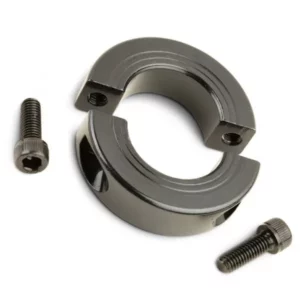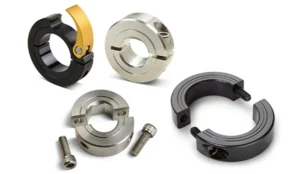Se você já passou um longo dia no campo, trazendo um trator teimoso de volta à vida ou lutando com uma colheitadeira emperrada, sabe que cada peça da máquina importa. Claro, as peças grandes — como motores e pneus — recebem toda a atenção, mas geralmente são os pequenos, como colares de eixo, que mantêm tudo funcionando. Esses heróis anônimos travam os eixos no lugar, mantêm as engrenagens estáveis e garantem que seu equipamento não pare no pior momento possível. Então, o que torna o melhor colares de eixo para máquinas agrícolas? Vamos nos aprofundar nisso — porque na agricultura, a diferença entre um bom dia e um desastre pode depender de um único componente.
Por que os colares de eixo são um grande negócio na fazenda
Imagine isso: É época de colheita, o sol está se pondo e você está correndo para colher o último milho. De repente, sua colheitadeira começa a fazer um barulho que assustaria um coiote das planícies. Você abre o capô e lá está — um eixo solto balançando como um espantalho bêbado. É aí que entram os colares de eixo. Esses anéis de metal — ou às vezes de plástico, dependendo do trabalho — prendem-se aos eixos giratórios para mantê-los seguros. Eles impedem o deslizamento, seguram acessórios como rodas dentadas ou polias e são atingidos por poeira, lama e qualquer outra coisa que o campo jogue neles.
Na agricultura, onde as máquinas funcionam muito e por muito tempo, um colar de eixo tem que ser resistente. Já vi fazendeiros improvisando consertos com arame e fita adesiva quando um falha, mas acredite em mim, não é assim que se vive. melhores colares de eixo para máquinas agrícolas são aqueles que não deixam você na mão — são feitos para durar, fáceis de instalar e não vão custar caro quando você precisar de uma dúzia para a frota.
O que procurar em um colar de eixo de primeira linha
Nem todos os colares de eixo são criados iguais. Ao longo dos anos, eu mexi em maquinário o suficiente para saber o que separa os vencedores dos fracassados. Aqui está o que você deve ficar de olho:
- Materiais que resistem à moagem: A agricultura não é gentil. Você precisa de opções como aço de liga ou aço inoxidável para trabalhos pesados — pense em eixos de trator ou bombas de irrigação. Para tarefas mais leves, alumínio ou mesmo latão podem funcionar, especialmente se a ferrugem for uma preocupação. Algumas pessoas juram por POM (um plástico resistente) para pontos de baixo atrito, enquanto liga de zinco ou ferro podem lidar com coisas difíceis. A chave? Combine o material com sua máquina e seu clima — campos úmidos exigem resistência à corrosão.
- Fabricação de precisão: Um bom colar de eixo não é apenas um pedaço de metal. Ele é forjado ou fundido, torneado em um torno, talvez até mesmo brochado ou fresado para um ajuste perfeito. Já vi colares tão lisos que deslizam como manteiga, e outros tão ásperos que mastigam o eixo. Procure aqueles que são retificados e testados — os detalhes são importantes.
- Tratamento térmico para tenacidade: Você já se perguntou por que algumas peças quebram como galhos enquanto outras continuam? O tratamento térmico — como carbonitretação ou têmpera a vácuo — faz a diferença. Ele endurece o metal, então ele evita vibração e desgaste. A têmpera também evita que ele fique quebradiço.
- Proteção de superfície: Uma coleira na chuva ou coberta de lama precisa de um escudo. Escurecimento, oxidação ou revestimento em pó podem afastar a ferrugem. Já vi até eletroforese sendo usada — é como uma pintura de alta tecnologia para metal.
- Ajuste personalizado: Não há duas fazendas iguais. Talvez você precise de um colar para um protótipo de trado de grãos, ou de cem para uma linha de fábrica de cultivadores. Os melhores fornecedores deixam você ajustar o design para se adequar ao seu equipamento.
Tebsa: O pessoal que faz isso desde 97
Agora, deixe-me falar sobre uma empresa que conheci — Tebsa. Esses caras fabricam peças como colares de eixo desde 1997, e eles têm as cicatrizes (e a inteligência) para provar isso. Com sede na Argentina, eles construíram um nome como fabricante profissional experiente, e eles são o tipo de parceiro em quem você pode confiar quando sua máquina está em risco.
Qual é o acordo deles? Para começar, eles prometem um Garantia de qualidade 100% em cada pedido. Isso não é só conversa — eles são certificados pela ISO9001-2015, o que significa que eles têm sistemas em vigor para respaldá-los. Gosto que eles também assumam seus erros — se algo estiver errado, eles consertarão, sem desculpas. Além disso, eles estão nisso há mais de 25 anos, então eles viram cada soluço que um fazendeiro poderia lançar sobre eles.
Tebsa também tem um talento especial para manter os custos baixos. Seus marketing estratégico competitivo significa que você está pagando cerca de 50% menos do que você faria com peças de marca original. Isso é um grande negócio quando você está equipando um celeiro inteiro de equipamentos. E eles não estão cortando custos — eles têm o variedade capacidade mecânica para lidar com tudo, desde um protótipo rápido até uma produção completa.
O verdadeiro problema? Eles equipe inteligente. Ouvi histórias de fazendeiros que enviam e-mails com um esboço em um guardanapo e, em 24 horas, seus engenheiros retornam com ideias. Esse tipo de velocidade e conhecimento facilita todo o processo, esteja você em apuros ou planejando com antecedência.
Materiais e processos que se adaptam à vida na fazenda
Uma coisa que eu amo na Tebsa é quantas opções eles jogam para você. Precisa de um colar de eixo para um velho arado enferrujado? Eles têm aço inoxidável ou fundidos. Trabalhando em um pulverizador leve? Experimente alumínio ou POM. Eles até oferecem latão, liga de zinco e fundidos — praticamente qualquer coisa que sua máquina deseje.
A usinagem deles também não é brincadeira. Eles forjam e fundem, torneiam peças em tornos e usam truques como polimento de engrenagens ou ranhuras para obter o ajuste perfeito. Tratamentos térmicos? Eles têm a linha completa — carburação, nitretação, têmpera de frequência, o que você quiser. E para acabamentos de superfície, eles vão enegrecê-lo, oxidá-lo ou aplicar um pouco de fosforização para mantê-lo funcionando durante as estações.
Uma vez conversei com um cara que jurou por suas coleiras personalizadas para seu sistema de irrigação. Disse que elas resistiram a duas enchentes e uma seca, sem problemas. Esse é o tipo de confiabilidade que você quer quando a Mãe Natureza está de mau humor.
Por que vale a pena dar uma olhada em Tebsa
A agricultura é uma tarefa difícil — o equipamento quebra, os orçamentos diminuem e o tempo é sempre curto. É por isso que eu apostaria meu dinheiro nos colares de eixo da Tebsa. Eles são feitos para aguentar uma surra e, pela metade do custo de marcas famosas, eles deixam você respirar. Além disso, a equipe deles está ao seu lado — o feedback 24 horas significa que você não fica na mão quando um prazo se aproxima.
Não importa se você está consertando um trator ou especificando um novo equipamento, esses colares atendem aos requisitos: resistentes, acessíveis e feitos sob encomenda. Não é de se espantar que eles estejam no mercado desde o final dos anos 90.
Coloque as mãos nas coisas boas
Se você está pronto para parar de mexer com peças frágeis e atualizar para o melhor colares de eixo para máquinas agrícolas, Vale a pena ligar para Tebsa. Dê uma passada caixas-de-engrenagens-agrícolas.com para ver o que eles estão preparando ou mande uma mensagem para um trabalho personalizado. Com seus Garantia de qualidade 100% e um histórico que remonta a 1997, você está em boas mãos. Sua maquinaria — e sua sanidade — agradecerão.
O que torna um colar de eixo “o melhor” para máquinas agrícolas?
É tudo uma questão de durabilidade e ajuste. Os melhores lidam com vibração, sujeira e umidade sem rachar. Procure materiais fortes como aço inoxidável ou aço de liga, além de tratamentos como carburação para endurecê-los. Um bom fornecedor — como a Tebsa — permite que você os personalize para seu equipamento específico.
Como sei qual material escolher para meus colares de eixo?
Depende da sua configuração. Aço inoxidável ou aço de liga são ótimos para trabalhos pesados e úmidos, como arados ou colheitadeiras. O alumínio é mais leve e resistente à ferrugem para máquinas menores. Plástico como POM funciona para pontos de baixo desgaste. Diga ao seu fornecedor com o que você está trabalhando — eles o orientarão corretamente.
A Tebsa pode realmente me economizar 50% em comparação com peças originais?
Essa é a alegação deles, e isso é verificado se você está comparando com grandes marcas OEM. Eles cortam custos ao otimizar a produção, não a qualidade. Você ainda está recebendo peças com certificação ISO, só que sem a margem de lucro do intermediário.
Com que rapidez posso obter um colar de eixo personalizado da Tebsa?
A equipe deles é rápida — feedback em 24 horas, e a prototipagem é rápida se você tiver clareza sobre o que precisa. A produção em massa demora mais, mas eles lhe darão um cronograma antecipadamente. Entre em contato com eles em agriculture-gear-boxes.com para acertar os detalhes.
Qual é a questão do tratamento térmico e acabamentos de superfície?
Tratamento térmico — como nitretação — torna os colares mais duros e duradouros. Acabamentos de superfície, como revestimento em pó, protegem contra ferrugem e sujeira. Para equipamentos agrícolas, ambos são embreagem — peças não tratadas se desgastam rapidamente no campo.



